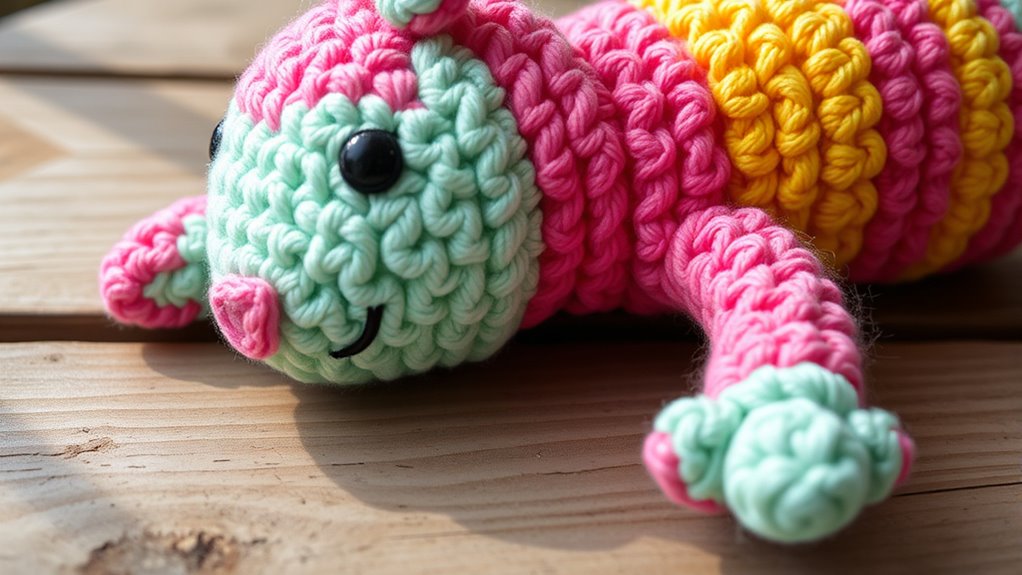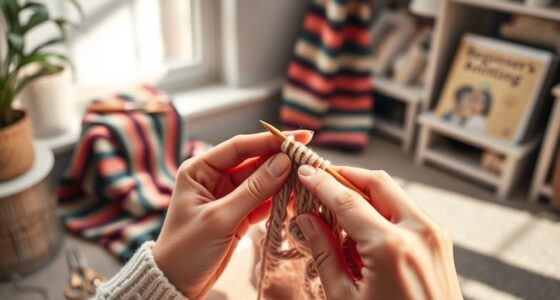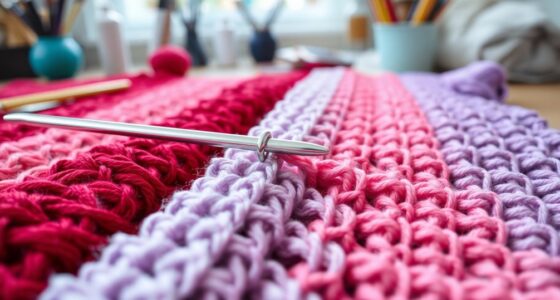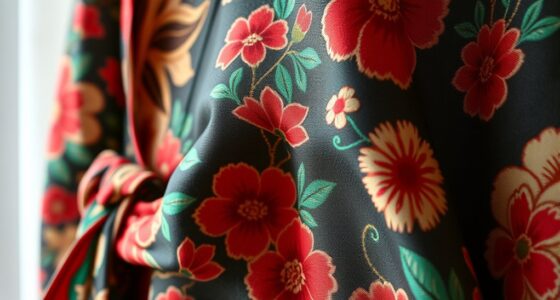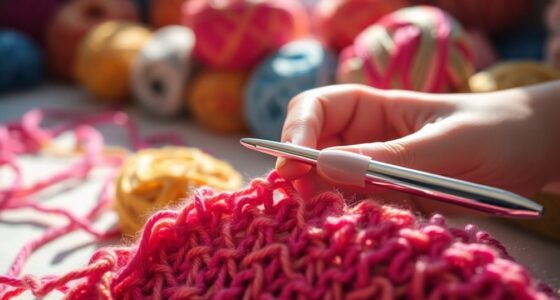To make your first crochet amigurumi, choose soft, vibrant worsted weight yarn and guarantee it’s consistent to avoid gaps. Use a smaller hook size within 2.5mm–4mm for tight stitches that hide stuffing. Opt for ergonomic tools to stay comfortable, and adjust your tension as needed. Practice basic techniques like magic ring and single crochet stitches. With patience and attention to detail, you’ll create polished, professional-looking toys—continue for more tips to perfect your craft.
Key Takeaways
- Use worsted weight yarn and small hook sizes (2.5mm–4mm) to create tight stitches that hide stuffing.
- Choose soft, smooth yarns like cotton or acrylic for a polished, comfortable finished toy.
- Select bright, vibrant colors for lively designs or neutral shades for subtle effects.
- Maintain consistent tension and stitch size by matching yarn labels with recommended hook sizes.
- Opt for ergonomic crochet hooks to reduce fatigue and improve precision during your first project.
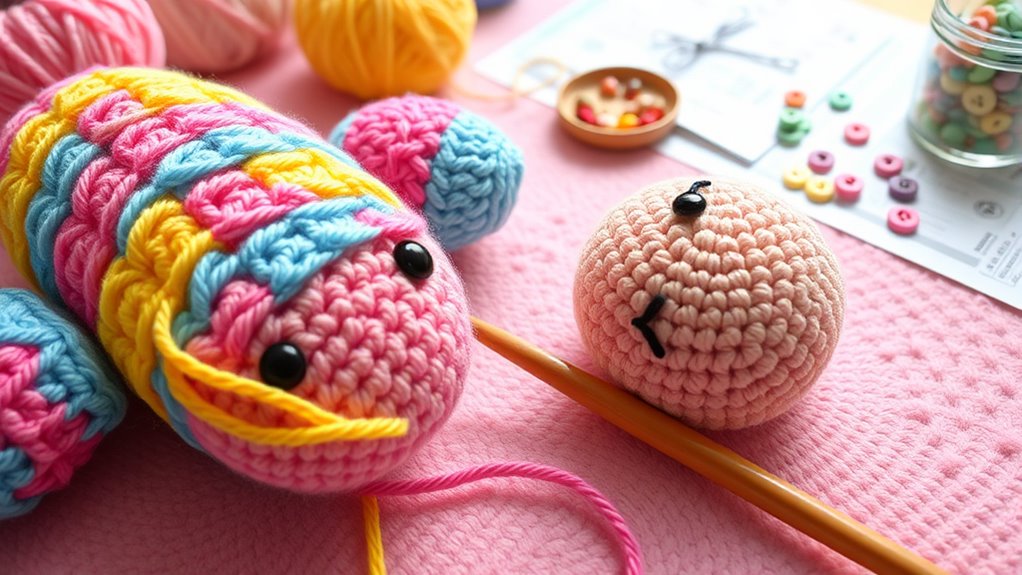
Have you ever wondered how to create adorable, plush creatures with just a hook and yarn? If you’re new to crochet amigurumi, getting started can feel overwhelming, but focusing on a few key tips makes it much easier. First, your yarn selection is vital. Opt for worsted weight yarn, which is thick enough to hold shape but still easy to work with. Choose soft, smooth yarns like cotton or acrylic, as they’re comfortable to handle and give your projects a polished look. Bright, vibrant colors can bring your amigurumi to life, but neutral shades work well for more subtle designs. When selecting yarn, check the label for the recommended hook size to guarantee your stitches are tight and even. Using a yarn with a consistent thickness helps prevent gaps or loose stitches, which are common pitfalls for beginners. Additionally, understanding color consistency can help your finished projects look more professional and cohesive.
Next, selecting the right crochet hooks makes a significant difference. For amigurumi, a smaller hook size within the recommended range on your yarn label—usually between 2.5mm and 4mm—is ideal. Smaller hooks help create tight stitches, which are essential for preventing stuffing from showing through your finished piece. If you find that your stitches are loose, switching to a slightly smaller hook can improve the firmness of your work. Ergonomic hooks can reduce hand fatigue, especially when you’re working on a larger project or practicing for extended periods. Also, keep a variety of hook sizes on hand; different parts of your amigurumi might require different sizes for the best results.
Frequently Asked Questions
What Are the Best Yarn Types for Amigurumi?
You should choose cotton or acrylic yarns for amigurumi, as they offer a smooth fiber texture that’s easy to work with. Cotton provides a sturdy, soft feel, while acrylic is affordable and comes in vibrant colors. When selecting yarn, consider your color selection to make your crochet toys lively and appealing. These yarn types help you achieve neat stitches and a durable finished toy, perfect for beginners.
How Do I Choose the Right Crochet Hook Size?
To select the right crochet hook size, consider your yarn’s weight and desired tightness. Opt for ergonomic crochet hooks to reduce hand fatigue, especially during long sessions. Test different sizes to see which creates even stitches without splitting the yarn. Also, think about yarn color selection to make sure your project looks vibrant. Picking the correct hook size helps your amigurumi stay firm and neat, making your first crochet toy a success.
How Can I Fix Mistakes in My Crochet Amigurumi?
When fixing mistakes in your crochet amigurumi, first carefully undo the stitches involved, ensuring you maintain stitch consistency. Use a yarn needle to weave in loose ends and correct color blending issues. If a section looks uneven, gently tighten or loosen stitches to even out tension. Practice patience, and don’t hesitate to redo sections if needed — your focus on stitch consistency will improve your overall look and finish.
What Safety Tips Are Important for Making Toys for Children?
Making toys for children is like building a safe fortress; you need sturdy, non-toxic materials to guarantee child safety. Always choose baby-safe yarn and stuffing, avoiding small parts that could be swallowed. Sew everything tightly, and double-check for loose ends. Keep sharp tools out of reach, and wash toys regularly. Prioritizing child safety helps you create adorable, worry-free crochet amigurumi that kids can enjoy securely.
How Do I Add Details Like Eyes and Accessories?
To add details like eyes and accessories, you can use embellishing techniques such as sewing on safety eyes or embroidering features with yarn or thread. Attaching small accessories like bows or buttons helps add personality to your crochet toy. Make sure all embellishments are securely fastened to prevent choking hazards, especially for children’s toys. Using different textures and colors also enhances your creation’s charm and uniqueness.
Conclusion
As you begin your amigurumi journey, remember that every stitch brings you closer to mastering a craft as timeless as the tales of old. Like a writer shaping a story, your patience and practice will turn simple yarn into charming creations. Embrace each mistake as a chapter in your skill’s evolution. Soon, your crochet toys will tell their own stories—testaments to your dedication, echoing the enduring magic of craftsmanship passed down through generations.
